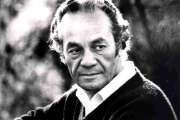|
Biografie Nicanor Parra
Nicanor Parra Sandoval (born in San Fabián de Alico, Chile on September 5, 1914) is a mathematician and poet often considered to be the most influential poet Chile has produced since Pablo Neruda.[citation needed] He describes himself as an "antipoet," due to his distaste for standard poetic pomp and function (after recitations he would exclaim Me retracto de todo lo dicho, or, "I take back everything I said").
Trying to get away from the conventions of poetry, Parra's poetic language renounces the refinement of most Latin American literature and adopts a more colloquial tone similar to prose. His first collection, "Poemas y Antipoemas" (1954) is a classic of Latin American literature, one of the most influential Spanish poetry collections of the twentieth century, and is cited as an inspiration by American Beat Writers such as Allen Ginsberg. Parra has been nominated several times for the Nobel Prize in Literature.
Parra comes from the artistically prolific Chilean Parra family of performers, musicians, artists, and writers. His sister, Violeta, is possibly the most important folk singer the nation has produced.
Nicanor Parra was born in 1914 in Chillan, a small town in southern Chile, the son of a schoolteacher. In 1933 he entered the Instituto Pedagogico of the University of Chile, and qualified as a teacher of mathematics and physics in 1938, one year after his first book appeared: Cancionero sin Nombre. After teaching in Chilean secondary schools, he went in 1943 to Brown University in the U.S. to continue his studies in physics. He returned to Chile as Professor at the University in 1946. Since 1952 Parra has been Professor of Theoretical Physics in Santiago, and has read his poetry in England, France, Russia, Mexico, Cuba, and the United States. He has published several books.
Cancionero sin nombre, 1937.
Poemas y antipoemas, 1954.
La cueca larga, 1958.
Versos de salon, 1962.
Manifiesto, 1963.
Canciones rusas, 1967.
Obra gruesa, 1969.
Los profesores, 1971.
Artefactos, 1972.
Sermones y prédicas del Cristo de Elqui, 1977.
Nuevos sermones y prédicas del Cristo de Elqui, 1979.
El anti-Lázaro, 1981.
Plaza Sésamo, 1981.
Poema y antipoema de Eduardo Frei, 1982.
Cachureos, ecopoemas, guatapiques, últimas prédicas, 1983.
Chistes para desorientar a la policía, 1983.
Coplas de Navidad, 1983.
Poesía política, 1983.
Hojas de Parra, 1985.
Poemas para combatir la calvicie, 1993.
Páginas en blanco, 2001.
Lear Rey & Mendigo, 2004.
Obras completas I & algo +, 2006.
Discursos de Sobremesa, 2006 (English transl. by Dave Oliphant "After Dinner Declarations", 2009, Host Publications, Inc.
|




